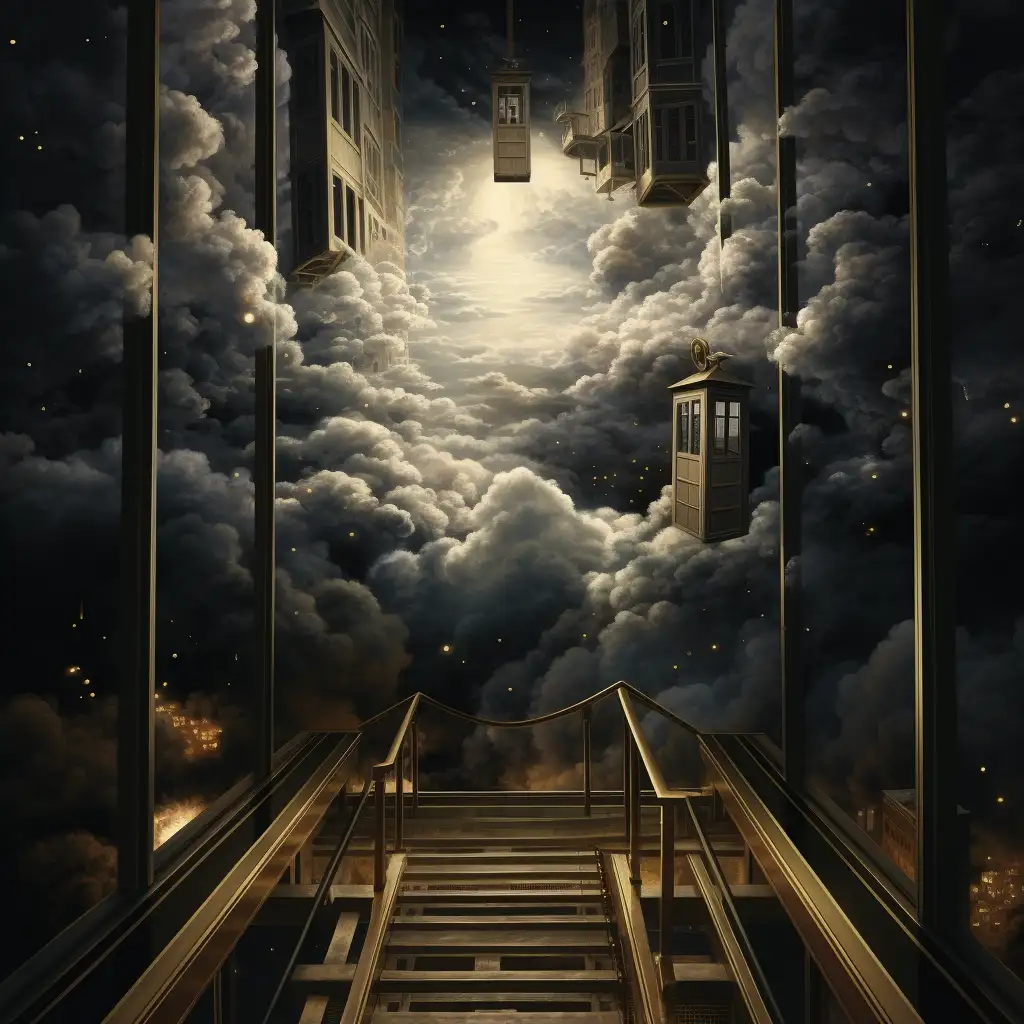Key Takeaways
2. Dream interpretation has been studied extensively by psychologists like Sigmund Freud and Carl Jung, with differing views on the meaning of dream symbols.
3. Elevators in dreams can symbolize personal growth, aspirations, fears, choices, and transitions in waking life.
4. The emotions experienced during the elevator dream and the context of the dream, including personal experiences and current life situations, play a vital role in interpretation.
5. Dream journaling is a helpful practice for understanding recurring themes and patterns in dreams, including those involving elevators.
6. Reflection on dream emotions and details can add depth to the interpretation of elevator dreams.
7. Elevator dreams may involve different scenarios, such as riding an elevator upwards, observing it from the outside, or sharing the ride with others, each offering unique insights.
8. Unusual or fantastical elevators in dreams can symbolize unconventional situations or surreal experiences in waking life.
9. Dream interpretation is a personal endeavor, and seeking help from a mental health professional is essential if dreams cause distress or require deeper exploration.
10. Elevator dreams can serve as metaphorical journeys through the subconscious, offering valuable insights into the dreamer’s mind and emotions.
Who hasn’t awakened from a dream, their heart pounding, wondering what it all means? Perhaps it was a dream about an elevator, a seemingly mundane object that transforms into a rich symbol in our subconscious world. You’ve probably had a few of these elevator dreams yourself, and like many people, you’ve found yourself asking, “What does it mean?”
Elevators in the Context of Dreams
Isn’t it fascinating how everyday objects can transform into compelling symbols in our dreams? One such symbol, frequently appearing in the dream-world, is the elevator. On any given day, you might step into an elevator without giving it much thought. After all, in our waking reality, elevators are simply practical devices that help us move efficiently between the floors of a building.
A Mundane Mechanism with a Deep Symbolic Significance
However, when an elevator appears in your dreams, it signifies something far more profound. These devices that mechanically transport us from one floor to another in real life serve as metaphysical vehicles in our dreams. They become means of travel through our own consciousness, moving not just through floors but through different levels of our psyche.
The Vertical Journey: Ascension and Descension
The unique characteristic of elevators is their vertical movement – upwards and downwards. This aspect transforms them into symbolic tools representing ascension and descension in our dreams. Going upward might reflect your aspirations, your ambitions, and the actions you’re taking towards achieving your goals. Descending in an elevator might suggest delving deep into your subconscious, facing your fears, or perhaps dealing with setbacks in life.
Doors Opening and Closing: Opportunities and Choices
Consider the opening and closing of elevator doors. Doesn’t it mirror the experiences in our lives? Opportunities that come and go, choices we make, paths we decide to step onto, or the ones we let pass – all can be represented by the simple act of an elevator door sliding open or shut.
The Interplay of Control and Surrender
Finally, think about the very act of taking an elevator ride. We select our desired floor, but once we’ve made that choice, we must surrender control. We trust the elevator to take us where we need to go. This act can symbolize life scenarios where we’ve made our choices, and then we must trust the process and let things unfold.

Psychological Theories Behind Dream Interpretation
Delving into the meaning of dreams is not a novel concept. In fact, the pursuit to understand these enigmatic visions has intrigued humanity for thousands of years. However, the systematic study of dreams, and their interpretation, gained substantial momentum with the emergence of psychological theories in the late 19th and early 20th centuries.
Sigmund Freud: Dreams as a Royal Road to Unconscious
The name most commonly associated with dream interpretation is probably Sigmund Freud. The father of psychoanalysis, Freud viewed dreams as the “royal road to the unconscious.” He believed that dreams were manifestations of our repressed desires and unfulfilled wishes.
In Freud’s perspective, the mind is made up of the conscious, preconscious, and unconscious parts. Our unacceptable desires, the ones that our conscious self cannot acknowledge, are pushed into the realm of the unconscious. Dreams, Freud suggested, are the disguised fulfillment of these suppressed desires. The symbols in our dreams, like elevators, according to Freud, are essentially coded messages from our unconscious.
Carl Jung: Dreams as a Bridge to the Unconscious
Carl Jung, a contemporary of Freud, agreed with him on the unconscious being a significant source of our dreams. However, he diverged from Freud by proposing that dreams aren’t just about repressed desires and wish fulfillment. Instead, Jung saw dreams as a means for our psyche to communicate with us, presenting critical insights for our personal growth and self-realization.
For Jung, dreams, and the symbols within them, serve as a bridge between our conscious and unconscious mind. An elevator in a dream, therefore, could be a symbolic representation of the mental journey between different levels of consciousness.
Dream Symbols: A Universal Language?
Freud and Jung also disagreed on the interpretation of dream symbols. While Freud saw these symbols as primarily personal, derived from the dreamer’s individual experiences, Jung proposed the concept of “collective unconscious.” He suggested that some dream symbols could be universal, derived from a shared human experience or history.
Therefore, in interpreting dreams about elevators, we could look at them through both lenses – as personal symbols unique to our experiences or as universal symbols representing common human themes like ascension and descension, control and surrender, opportunities and choices.
Common Interpretations of Elevator Dreams
When you dream about an elevator, the details can significantly impact its interpretation.
Dreams About Riding an Elevator Upwards
An upward moving elevator often represents personal growth, achievements, and aspirations. But what if you felt fear or anxiety during the ride? This might suggest that you’re feeling uneasy about the pace or direction of your life changes.
Dreams About Riding an Elevator Downwards
Conversely, an elevator moving downward might symbolize introspection, self-exploration, or handling setbacks. If fear accompanies the descent, it may represent your worries about facing certain realities or emotions.
Dreams About Being Stuck in an Elevator
Getting stuck in an elevator can be a sign of feeling trapped or stagnant in your current life situation. If you’re alone, it might highlight a sense of isolation. But if others are with you, you could be feeling constrained by social pressures or relationships.
Dreams About Falling Elevators
Falling elevators can be quite unsettling. These dreams often point to anxieties, fears, or a potential major disruption in your life.
Dreams About Broken or Malfunctioning Elevators
A broken or malfunctioning elevator could symbolize unexpected problems or a lack of control in your life, indicating feelings of instability or unease.
Variations of Elevator Dreams and Their Possible Meanings
Dreams are deeply personal experiences, filled with imagery that can be as varied as our individual lives. The meaning of an elevator in your dream can drastically change based on the context, the people involved, and the emotions that accompany the dream. Let’s delve into some of these variations and what they could potentially signify.
Watching the Elevator From the Outside
If you find yourself observing an elevator from a distance or watching it move up and down without being inside it, this might indicate feelings of detachment or exclusion in your waking life. You might be feeling left out of a situation or feel like an outsider looking in. The state of the elevator could also reflect your feelings about the situation: a smoothly operating elevator might suggest that things are progressing well, while a broken or erratic elevator could point to perceived problems or instability.
Sharing the Elevator Ride
Who are you sharing the elevator ride with in your dream? Are they familiar faces or strangers? Your interactions with these individuals could shed light on your relationships or social dynamics in your waking life.
If you’re in an elevator with people you know, it might represent your relationship with these individuals. The mood in the elevator can provide further insight. Is it a peaceful ride, or is there tension? Are you all heading to the same floor or different ones? These details might hint at the nature and direction of your relationships.
If you’re in an elevator with strangers, it could suggest unfamiliar or unexpected elements in your life. Perhaps you’re in a new situation or environment, dealing with new people or challenges.
Unusual or Fantastical Elevators
Dreams often blur the lines of reality, giving rise to scenes and scenarios that defy the laws of the physical world. Suppose you dream of an unusual or fantastical elevator, like one that moves sideways or an incredibly luxurious or futuristic one. In that case, it could be a symbol of the unique or unconventional situation you’re navigating in your waking life.
Perhaps you’re embarking on a path less traveled, pursuing an unconventional career, or adopting an unorthodox approach to a situation. Or maybe, you’re in a situation that feels surreal or overwhelming, represented by the fantastical elevator.

Context Matters: Personal Factors Influencing Dream Interpretations
As we journey into the world of dreams, it’s crucial to remember that these nocturnal narratives are deeply personal. Your dreams are a reflection of your mind, influenced by your thoughts, emotions, experiences, and the unique tapestry of your life. Therefore, interpreting dreams, especially symbols like elevators, must also be a personal endeavor.
Emotions: The Color Palette of Dreams
Think of emotions as the color palette of your dreams. They set the tone, tinting the dream symbols with their hues. An elevator ride filled with joy can have a different meaning compared to one tinged with fear or sadness. Even within the same dream, your shifting emotions can offer valuable clues about the meaning of the elevator. It’s essential to explore how you felt during the dream and upon waking up, as these emotions can add depth to your interpretation.
Personal Experiences: The Dream’s Context
Your personal experiences form the backdrop against which your dreams play out. Past memories, present circumstances, and future aspirations can all shape the narrative of your dream. For instance, if you’ve recently experienced significant changes in your life (like moving to a new city or starting a new job), an elevator in your dream might symbolize this transition.
Current Life Situations: The Mirror of Dreams
Dreams often serve as a mirror, reflecting our waking life situations. If you’re facing challenges or dealing with emotional turmoil, these scenarios might find a way into your dreams, influencing the symbols and their interpretations. An elevator in a dream during a calm phase of your life might have a different meaning than during a tumultuous one.
Unique Personal Associations: Your Individual Dream Language
Finally, remember that each person has a unique ‘dream language.’ The same symbol can mean different things to different people, based on their personal associations. If you’ve had unique or impactful experiences involving elevators, they’re likely to influence how you interpret an elevator in your dreams.
Practical Steps to Decipher Your Elevator Dreams
Venturing into the world of dreams to unravel their meanings can seem like a daunting task. However, with the right tools and approach, it can be a revealing and insightful journey. Here are some practical steps to help you decipher your elevator dreams.
Keeping a Dream Journal
Keeping a dream journal can be an invaluable first step in understanding your dreams. It serves as a canvas where you can paint a vivid picture of your dreams while the memories are still fresh.
Upon waking, take a moment to recollect your dream and jot down every detail you remember. Describe the elevator, your feelings, the people with you, and any other symbols present. Remember, even the seemingly trivial details can hold significance. As you fill this journal over time, patterns and recurring themes might start to emerge, helping you decode your dream language.
Reflecting on Your Dream Emotions
Next, reflect on the emotions you experienced during the dream. Did you feel happy, scared, or neutral during the elevator ride? Was the journey smooth or turbulent? Your emotional state can offer clues about what the elevator represents in your life. Recalling these emotions and writing them down in your dream journal can add another layer of depth to your interpretations.
Considering Personal Experiences and Current Life Situations
Consider your personal experiences and current life situations as you try to decipher your dream. Are you currently experiencing a significant life change or transition? Have you had any past experiences or memories associated with elevators? These real-life contexts can shed light on what the elevator might symbolize in your dream.
Seeking Professional Help
Lastly, if you’re feeling distressed or overwhelmed by your dreams, particularly if they’re recurring or particularly unsettling, don’t hesitate to seek help from a mental health professional. Dreams can sometimes bring to light deeper psychological issues that may require professional attention. A licensed therapist or a counselor experienced in dream interpretation can provide guidance and help you navigate the sometimes murky waters of your subconscious mind.
Conclusion
Dreams continue to captivate us, don’t they? While we may never fully comprehend their mystery, we can appreciate the insights they offer into our minds. Elevator dreams can be a rich source of self-discovery, serving as a metaphorical ride through your subconscious. So next time you find yourself in an elevator in your dreams, buckle up and enjoy the ride! You might just wake up with a new understanding of yourself.
FAQs
A: Dreaming about elevators is quite common because elevators represent transitions, changes, and shifts in our lives. These dreams can occur when you are experiencing significant life changes or facing decisions that may lead to new opportunities.
Q: I frequently dream about elevators going out of control. Is there a specific meaning to this?
A: Dreams of elevators malfunctioning or going out of control may indicate a lack of control over a situation or heightened anxiety about an upcoming change. It could also suggest that you are overwhelmed with emotions and struggling to manage them.
Q: Can elevator dreams be influenced by real-life experiences?
A: Yes, dreams are often influenced by our daily experiences, emotions, and thoughts. If you have recently ridden an elevator, had an intense conversation, or encountered a life-changing event, it might manifest in your dreams.
Q: Is there a connection between elevator dreams and fear of heights?
A: There can be a connection between elevator dreams and fear of heights, but it’s not always the case. Elevators in dreams are more commonly associated with transitions and changes rather than acrophobia. However, personal fears can intertwine with dream symbols.
Q: Can recurring elevator dreams carry different meanings each time?
A: Yes, recurring elevator dreams can have varying meanings based on the evolving circumstances in your life. It’s essential to reassess your emotions and life events each time you have such dreams to understand their changing significance.
Q: Should I be concerned if I frequently dream about elevators?
A: Not necessarily. Dreaming about elevators is common and often reflects the transitions and changes we encounter in our waking lives. However, if these dreams cause excessive anxiety or affect your daily well-being, it may be helpful to explore them further with a professional, such as a therapist or counselor.



